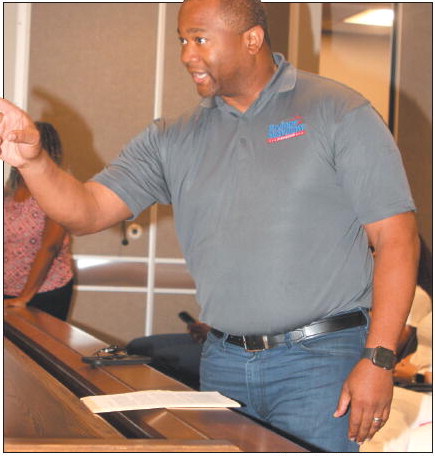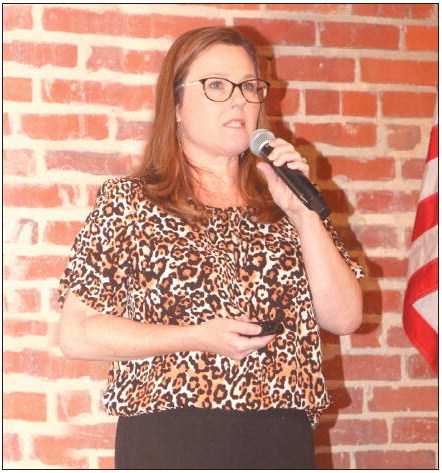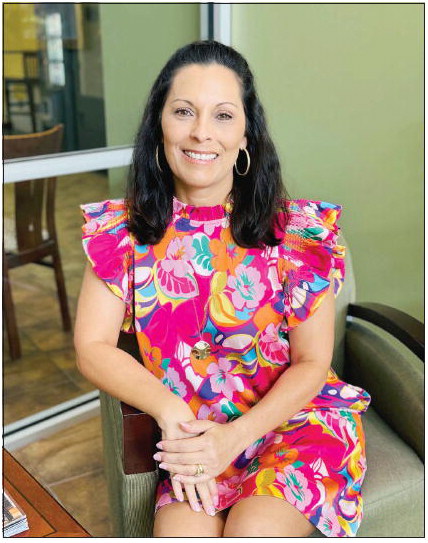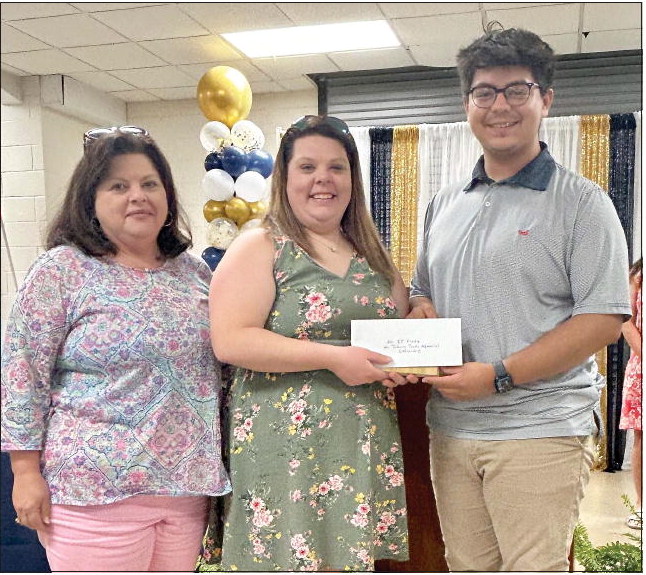“Rural economic development requires a multifaceted approach, and the Strike Team will serve to centralize those efforts and ensure that everyone is pulling the plow in the same direction to move the needle for rural Georgia.”
continued from page
ground throughout rural Georgia to raise the competitive visibility of areas like Vidalia.”
He added, “With more than 20 years of experience in rural economic development, Brian Marlowe has a proven track record of locating new projects and expanding existing industries in rural Georgia, and his team will work alongside leaders in Vidalia to build on the region’s momentum. By leveraging regional assets and the world class team at the Georgia Department of Economic Development, the Strike Team will serve to bolster the efforts already underway to create opportunities for hardworking folks in Vidalia and throughout the region.”
He pointed out, “Countless businesses are now looking to relocate their operations to states where they know they can grow and succeed, and thanks to our efforts to protect lives and livelihoods, they know the Peach State stands ready to work with them.”
As potential investors look to Georgia, the Strike Team will work with local leaders, state agencies, and the General Assembly to champion policies and programs that raise the visibility of all that rural Georgia has to offer. “Rural economic development requires a multifaceted approach, and the Strike Team will serve to centralize those efforts and ensure that everyone is pulling the plow in the same direction to move the needle for rural Georgia,” the governor said.
“I think the Rural Strike Team is a great idea if it is done right,” said Joseph S. Filippone, Executive Director of the Montgomery County Development Authority. “This is key: I would like to see a specific plan that will target the smaller counties with limited financial resources, little if any infrastructure, and small work forces.” Filippone acknowledged that nearby counties that are more economically developed like Toombs and Laurens “have a better chance at hitting the ball from the plate than Montgomery County has.” In Montgomery County, total resources for economic development are $83,000, (.5 mill) annually. “We have an industrial park, but with no water and sewer. If we attract someone we have to convince them that Montgomery County is a good place to live, but they will have to put in their own water and sewer. We struggle. Here, we try to focus on retail development, but even that is not easy to do. If the Strike Team will at least put it on their agenda to come up with a plan for the smaller counties, that would be encouraging.”
Neighboring Wheel er County is even less populated than Montgomery County and outside of an abundance of land and water, has little to offer in attracting traditional industrial development except low taxes and plenty of space. The biggest employers in the county are a privately- owned correctional facility and the Wheeler County Board of Education. Major industries in the county are logging and agriculture, including tree farming and straw production, but with a state park, airport and plenty of scenic spots for recreation within its borders, the county should be a prime location for agritourism, an up and coming industry.
Regarding traditional industrial development, Wheeler County Chamber of Commerce board member and Development Authority member businessman Rodney Brooks commented in a recent meeting, “It is the chicken and the egg scenario. Here, you can’t establish a workforce because of the lack of industry and you can’t establish an industry because of the lack of a workforce.” Wheeler County is among the state’s low wealth counties and customized, innovative strategies must be developed and implemented if Wheeler is to prosper, said Chamber President Janice Mock. “We stand ready to work on this, but we need help from the experts and we need the connections to make this happen. Right now, we have unreliable cell phone service and limited broadband. These issues and a lot of others have to be addressed before we can make any progress.” She expressed hope that a new pole rental initiative guided by the Public Service Commission and that brings together private investors and the rural electrical membership corporations will finally resolve the rural broadband dilemma. “That is a crucial step, but it’s just the beginning in creating forward momentum for Wheeler County.”
Nearby Soperton, which just announced the location there of a biorefinery plant which will start production in 2022, and Eastman with nationally successful business built at its airport/industrial park are prime examples of the possibilities of creating industries in rural environments which take advantage of area assets and talent.
“To keep rural Georgia strong and remain the top state for business, I am laser-focused on bringing projects of regional significance to communities wanting to grow,” Kemp said. “By partnering with elected officials and economic developers, we can highlight the incredible people, places, and resources that exist outside of major metro areas.” He said the strike team will raise the visibility of regional economic development assets – specifically, large industrial sites outside of metro-Atlanta – and unite communities to market those sites to potential prospects.
“These large projects will benefit multiple counties, dozens of communities, and hundreds of hardworking Georgia families. Working together, we will ensure rural Georgia’s best days are ahead,” the governor said.
Through the Governor’s Office, the Rural Strike Team will leverage state resources such as the Georgia Department of Economic Development’s (GDEcD) Global Commerce team, the Department of Community Affair’s (DCA) regional team, UGA’s Carl Vinson Institute, the Abraham Baldwin Agricultural College’s (ABAC) Rural Prosperity Center, and others to craft a marketing plan specific to the site, develop a target list on specific industries, and provide training to local leaders who are actively recruiting business prospects.
Furthermore, a rural economic development coordinator will work closely with the Rural Strike Team, state and local agencies, and thirdparty organizations efforts to spur greater opportunities in rural Georgia.
The governor also announced a statewide “Georgia Made” tour to raise awareness and show support for local businesses and manufacturers providing jobs and opportunity to communities across Georgia.
“For the next several months, I look forward to highlighting what local businesses are doing to employ hardworking Georgians in rural communities and how we can help those businesses continue to succeed,” he added.
As the new Deputy Commissioner for Rural Georgia, it will be Marlowe’s responsibility to put together the strike force and to build a plan for rural Georgia. Ma r l owe has served as Tift County Development Aut hority President and CEO and has extensive experience in economic development and local government in rural Georgia. He has a successful track record of new industry locations as well existing industry expansions, representing thousands of jobs and hundreds of millions of dollars in local investment.
Marlowe is actively involved in numerous local, regional, state, and national organizations supporting economic development in rural Georgia. Included among these are the Georgia Economic Developer’s Association (GEDA), the Southern Economic Development Council (SEDC), the International Economic Development Council (IEDC), the Georgia Chamber of Commerce Board of Governors, and the Georgia Association of Chamber of Commerce Executives (GACCE). Most recently, he served as a member of Governor Kemp’s transition team. Brian continues to advocate for issues important to rural Georgia. These include broadband access, healthcare, education, transportation, and economic development.
Marlowe’s academic credentials include a bachelor of science degree in economics from Florida State University and a master of public administration degree from Valdosta State. He also possesses numerous leadership and economic development certifications and awards from various organizations. “We’re excited to welcome Brian Marlowe to our team at the Georgia Department of Economic Development and appreciate the governor’s continued attention to capitalizing on our state’s rural assets,” said GDEcD Commissioner Pat Wilson.
“As the top state for business, Georgia has a proven history of being a top competitor for investment from every major industry sector in every community – large and small. The first three months of fiscal year 2021 are off to a strong start as we’ve announced new jobcreating economic development projects in all 12 regions of our state. Working with Brian Marlowe and the Rural Strike Team, along with our sister state agencies, local economic developers, and partners in the General Assembly, we will continue to work tirelessly to land projects in rural Georgia and build on Georgia’s incredible momentum.”
Michele Johnson, Toombs- Montgomery County Chamber of Commerce President and Executive Director of the Toombs County Development Authority, commented, “I’m excited to learn more about the Rural Strike Team effort. I know that Brian Marlowe understands rural Georgia, so I look forward to his leadership in this critical area.”
“Rural economic development requires a multifaceted approach, and the Strike Team will serve to centralize those efforts and ensure that everyone is pulling the plow in the same direction to move the needle for rural Georgia.”
– Governor Brian Kemp






